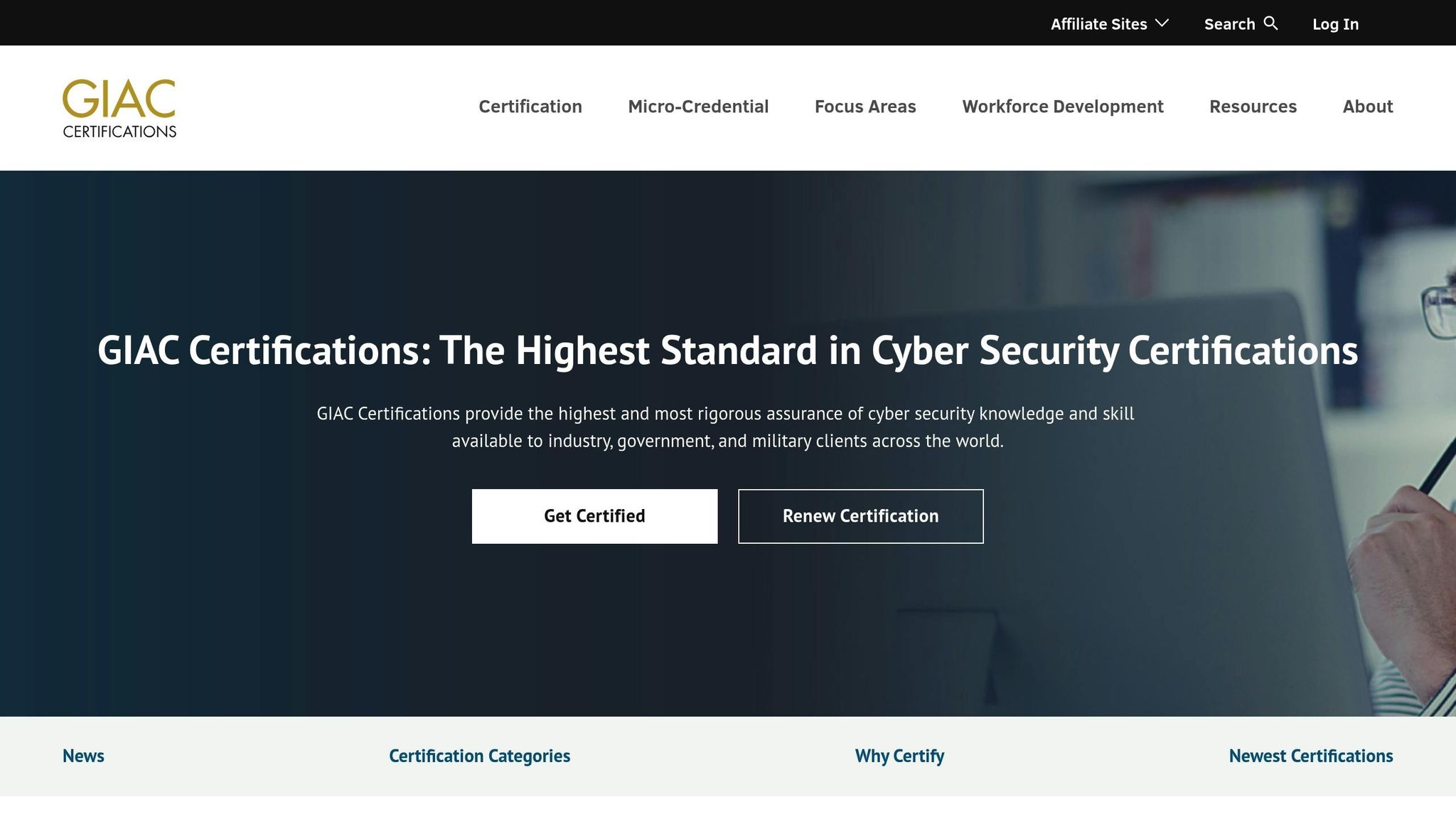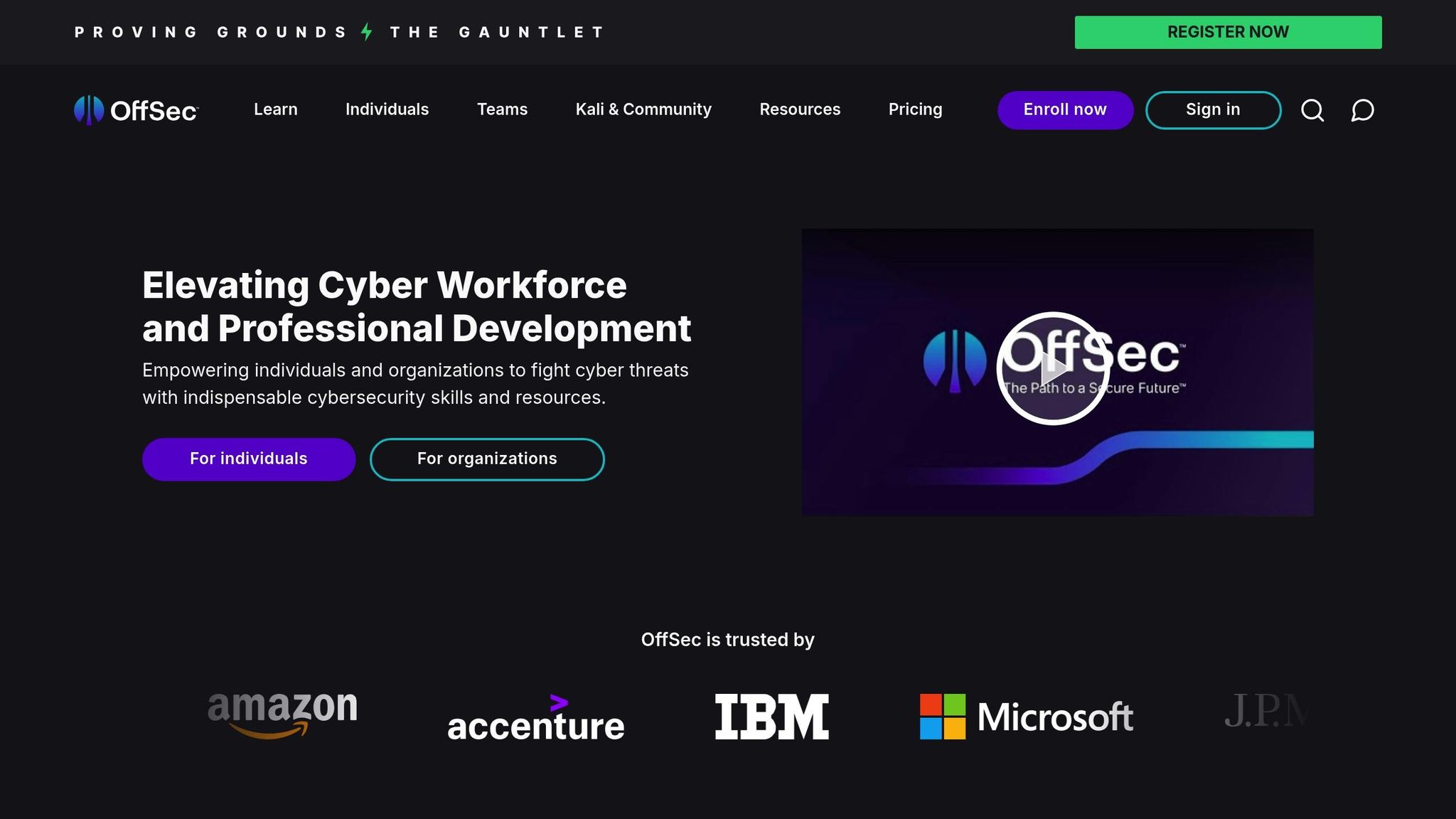If you're looking to advance your cybersecurity career, network security certifications can help you stand out. They validate your skills, increase earning potential, and open doors to better opportunities. Here's a quick breakdown of five key certifications to consider:
- CISSP: Best for experienced professionals aiming for senior roles like CISO or Security Manager. Requires 5+ years of experience and covers topics like risk management and secure architecture.
- CompTIA Security+: Perfect for beginners. No prerequisites, affordable, and covers basic security concepts for entry-level roles.
- CEH: Focuses on ethical hacking and penetration testing. Ideal for intermediate professionals with some IT security experience.
- GSEC: Aimed at entry-level professionals with a technical background. Covers general security principles and incident handling.
- OSCP: Advanced certification for penetration testers. Requires hands-on skills in Linux, networking, and scripting, with a challenging 24-hour practical exam.
Quick Comparison
| Certification | Experience Level | Focus Area | Typical Roles |
|---|---|---|---|
| CISSP | Advanced | Risk management, strategy | CISO, Security Manager |
| CompTIA Security+ | Beginner | General security basics | SOC Analyst, IT Auditor |
| CEH | Intermediate | Ethical hacking | Penetration Tester, Cyber Analyst |
| GSEC | Entry-level | Security principles | Security Analyst, Incident Handler |
| OSCP | Advanced | Penetration testing | Red Team Specialist, Pen Tester |
Choose a certification that aligns with your career goals and experience level. Whether you're just starting out or aiming for senior roles, these certifications can help you grow in the cybersecurity field.
The Best and Worst Cyber Security Certificates 2025 (HUGE Update)
1. Certified Information Systems Security Professional (CISSP)
The CISSP certification, offered by (ISC)², is widely regarded as one of the top credentials in cybersecurity. It was the first certification in information security to meet the rigorous ANSI/ISO/IEC Standard 17024, solidifying its reputation in the field. With more than 165,000 certified professionals globally as of 2025, it represents a benchmark for expertise in cybersecurity. However, this is not an entry-level certification - it’s specifically designed for seasoned professionals aiming to step into senior-level roles.
Prerequisites
To qualify for the CISSP, candidates need at least five years of professional experience in two or more of the eight CISSP domains. A one-year experience waiver is available for those with an eligible degree or an (ISC)²-approved certification. If you pass the exam but don’t yet meet the experience requirement, you can earn the title of Associate of (ISC)² and have up to six years to gain the necessary experience.
Skill Level
This is an advanced certification, tailored for experienced professionals responsible for designing, implementing, and managing enterprise-level cybersecurity programs. What matters most is the scope of your responsibilities - tasks like managing access controls, conducting risk assessments, or implementing secure network protocols all count toward the required experience.
Exam Format and Cost
The CISSP exam uses an adaptive format, consisting of 100 to 150 questions to be completed within four hours. The pass rate hovers around 65–70%.
Core Topics Covered
The certification covers eight domains that make up the Common Body of Knowledge (CBK):
- Security and Risk Management
- Asset Security
- Security Architecture and Engineering
- Communication and Network Security
- Identity and Access Management
- Security Assessment and Testing
- Security Operations
- Software Development Security.
For those focusing on network security, Domain 4 is particularly relevant. It delves into secure network architecture, protecting components, and ensuring secure communication channels. This comprehensive approach equips professionals with the skills needed to handle complex network security challenges.
For example, a retail company successfully safeguarded its growing hybrid cloud environment by implementing a defense-in-depth strategy. This included redundant firewalls, intrusion detection systems, and DDoS protection - an excellent demonstration of effective network security practices (Source: Destination Certification, April 2025).
Career Relevance and Typical Job Roles
Achieving CISSP certification opens doors to senior positions like Chief Information Security Officer (CISO), Security Consultant, Security Manager, Security Architect, and IT Director. It’s particularly valuable for professionals transitioning from technical roles to leadership positions, as it provides a broad knowledge base that adapts well to evolving technologies. Mastering the CISSP domains not only enhances your career trajectory but also increases your value to employers.
2. CompTIA Security+

CompTIA Security+ serves as a great starting point for anyone new to cybersecurity. Unlike more advanced certifications like CISSP, Security+ focuses on building a strong foundation without requiring formal prerequisites. This makes it an excellent choice for those beginning their cybersecurity careers.
Prerequisites
CompTIA exams are open to all - there are no mandatory educational, training, or certification requirements to sit for the exam. However, CompTIA suggests having at least two years of IT administration experience (preferably with a focus on security) and a CompTIA Network+ certification to better prepare for the material. While these are not strict requirements, they can offer a helpful boost in understanding the concepts.
Skill Level
Security+ is designed as an entry-level certification, making it suitable for career changers, recent graduates, or IT professionals looking to step into cybersecurity roles. It bridges the gap between general IT knowledge and more specialized security skills, providing a strong platform to pursue advanced certifications down the line.
3. Certified Ethical Hacker (CEH)
The Certified Ethical Hacker (CEH) certification, offered by EC-Council, focuses on developing offensive strategies to strengthen network security. It’s designed to validate your ethical hacking skills and expertise.
Eligibility Criteria:
- You can qualify by completing an official EC-Council training course.
- Alternatively, if you have at least two years of professional experience in fields like network security, systems administration, data protection, or ethical hacking, you can skip the training and go straight to the exam.
For candidates under 18, additional steps are required. They must provide written consent from a parent or legal guardian, along with a recommendation letter from an accredited institution.
This certification is all about mastering offensive techniques, giving you the tools to bolster your network defense skills.
4. GIAC Security Essentials (GSEC)

The GIAC Security Essentials (GSEC) certification is designed for those just stepping into the world of cybersecurity. Offered by the Global Information Assurance Certification (GIAC), it provides a solid introduction to security principles and serves as a stepping stone toward more advanced areas like network security.
Prerequisites
There are no strict prerequisites for this certification. That said, GIAC recommends having some background in information systems and networking. They also suggest at least a year of experience in security-related roles to better prepare for the material.
Skill Level
The GSEC is tailored for entry-level professionals who already have a basic understanding of IT. It helps bridge general IT knowledge with more focused cybersecurity skills, making it a great starting point for newcomers to the field.
sbb-itb-8a31326
5. Offensive Security Certified Professional (OSCP)

The Offensive Security Certified Professional (OSCP) is a hands-on certification that sets itself apart by requiring candidates to prove their penetration testing skills through practical lab exercises and a grueling 24-hour exam. This is not your typical multiple-choice test - it's all about demonstrating real-world expertise.
Skill Level
The OSCP is geared toward seasoned IT professionals who specialize in offensive security. It’s not beginner-friendly, as it demands a solid grasp of IT fundamentals. If you’re just starting out, focus on mastering networking, operating systems, and security basics before diving into this certification.
Prerequisites
While there are no formal prerequisites, Offensive Security strongly advises candidates to have a robust technical foundation. You’ll need experience with Linux command line operations, an understanding of networking protocols, and scripting know-how in languages like Python or Bash. Most successful candidates bring 2–3 years of hands-on IT experience to the table and are already proficient in manual exploitation techniques and identifying common vulnerabilities. This technical depth is crucial for tackling the OSCP’s challenging, hands-on approach.
Core Topics Covered
The OSCP curriculum is all about practical penetration testing. Key areas include:
- Information gathering and vulnerability assessment
- Buffer overflow exploitation and web application attacks
- Privilege escalation techniques
- Network enumeration using tools like Nmap, Netcat, and custom scripts
Training spans both Windows and Linux environments, emphasizing manual exploitation over automated tools. The goal? To teach you how to uncover and exploit security gaps in realistic scenarios.
Exam Format and Cost
The OSCP exam is a 24-hour practical test that costs $1,499. Candidates must compromise multiple machines and document their methods. Success requires demonstrating both initial access and privilege escalation. After the exam, you’ll have an additional 24 hours to submit a detailed report of your findings.
Career Relevance and Typical Job Roles
Earning an OSCP certification can significantly boost your career prospects. It’s highly regarded by cybersecurity firms across the U.S. and opens doors to roles like:
- Penetration Tester
- Security Consultant
- Red Team Specialist
- Vulnerability Assessment Analyst
Because the OSCP focuses on practical, hands-on skills, certified professionals are especially valuable to organizations looking to simulate and defend against realistic cyberattacks. This certification is often paired with competitive salaries and high demand in the job market.
Certification Comparison Chart
Selecting the right network security certification means considering factors like prerequisites, exam format, preparation time, and career goals. Here's a quick comparison of five well-known certifications:
| Certification | Prerequisites | Exam Format & Investment Summary | Skill Level | Core Topics | Career Relevance |
|---|---|---|---|---|---|
| CISSP | Requires years of professional experience or an equivalent academic background | Multiple-choice exam; reflects its advanced level with higher costs and effort | Advanced/Management | Covers broad topics like risk management and security architecture | Suitable for senior roles like Chief Information Security Officer (CISO) or Security Manager |
| CompTIA Security+ | No formal prerequisites, ideal for beginners | Mix of multiple-choice and hands-on questions; affordable and beginner-friendly | Beginner to Intermediate | Focuses on foundational topics like network security, threat management, and compliance | Great for entry-level roles such as SOC Analyst or IT Auditor |
| CEH | Requires a basic IT security foundation | Primarily multiple-choice; candidates often supplement with formal training to enhance practical skills | Intermediate | Teaches ethical hacking and penetration testing basics | Geared toward roles in penetration testing and cybersecurity analysis |
| GSEC | No strict prerequisites, though a technical background is recommended | Combines theory and practice; cost reflects its comprehensive training approach | Intermediate to Advanced | Covers incident handling, secure communications, and risk management | Fits roles in security analysis and incident response |
| OSCP | Strong technical foundation is advised | Hands-on practical exam simulating real-world scenarios; demands significant self-study and lab work | Advanced | Focuses on penetration testing techniques and vulnerability assessments | Tailored for specialized roles like penetration tester or red team specialist |
This table offers a snapshot, but each certification comes with unique challenges and benefits. Costs, exam formats, and preparation requirements differ depending on the certification's focus and difficulty level. For instance, while some rely on multiple-choice exams to test theoretical knowledge, others include hands-on exercises that replicate real-world situations. The certification level also plays a role in career progression and salary expectations.
At Root School, we provide the tools and guidance you need to navigate these options and take the next step in your cybersecurity journey.
How to Pick the Right Network Security Certification
Choosing the right network security certification is all about aligning your current skills with your future goals. With cybersecurity jobs projected to grow by 33% between 2023 and 2033, now is a great time to invest in certifications that can elevate your career.
Start by clarifying your career focus. Are you interested in penetration testing, network security, governance, or compliance? Maybe you’re eyeing leadership roles in the future. Your long-term goals should guide your decision. For instance, certifications like CISSP are ideal for those aiming for executive or management positions, as they cover strategic management concepts. On the other hand, if hands-on penetration testing excites you, certifications like OSCP, which emphasize practical skills, might be a better fit.
Next, consider your experience level. Beginners might find entry-level certifications like Security+ a more approachable starting point, while advanced credentials such as CISSP are better suited for seasoned professionals.
It’s also important to distinguish between certifications that focus on hands-on skills and those that provide a broader theoretical foundation. Certifications like CEH and OSCP highlight practical proficiency with specific tools and methodologies, which can be appealing to employers looking for proven technical skills. In contrast, theory-heavy certifications are often more suitable for career changers or those exploring a variety of cybersecurity specializations.
Don’t overlook costs and potential employer reimbursements. Certification prices range widely - from a few hundred dollars for entry-level programs to thousands for advanced ones. Many employers offer reimbursement for certification expenses, so check with your current or prospective employer before spending your own money.
Market demand is another key factor. According to 2025 Cyberseek data, CISSP is the most in-demand certification, with 82,494 job postings mentioning it. Meanwhile, CompTIA Security+ leads in total certified professionals, boasting 265,992 holders. These numbers reflect the value of these certifications and the level of competition you might encounter.
Your preferred learning style and available preparation time should also influence your choice. Exam formats vary widely. If you thrive with hands-on practice, certifications like OSCP could be a better match. On the other hand, if structured study suits you, consider theory-based certifications.
Lastly, keep an eye on the evolving cybersecurity landscape. This field changes constantly, with new threats and technologies emerging all the time. Look for certifications that stay updated with current methodologies to ensure your skills remain relevant.
Remember, certifications are just the beginning. Many professionals start with foundational credentials like Security+, then move on to specialized certifications such as CEH or GSEC, and eventually pursue advanced ones like CISSP as they gain more experience.
Take the time to choose a certification path that aligns with both your skills and career aspirations. Use resources like Root School to help you navigate your journey and achieve your goals.
Conclusion
Network security certifications are a testament to your skills and dedication to staying ahead of evolving cyber threats. With the growing need for cybersecurity professionals, these credentials can open doors to new opportunities and career growth.
From CompTIA Security+, ideal for beginners, to CISSP, designed for seasoned executives, each certification fits distinct career paths and experience levels. These programs tackle essential topics such as firewalls, encryption, intrusion detection, and ethical hacking.
But earning a certification is just the start. To truly excel, focus on building technical expertise in areas like Windows, Linux, Azure, AWS, Python, and SQL. Pair these skills with strong communication abilities to clearly explain complex concepts - a critical asset in this field.
Gaining hands-on experience is equally important. Seek out internships, entry-level roles, or even volunteer opportunities to apply what you’ve learned. Leverage free trials from cloud providers to familiarize yourself with industry tools. Additionally, networking - whether through LinkedIn or local cybersecurity meetups - can help you connect with professionals and uncover new opportunities.
"So they are hiring my students even before they finish their degree. As long as they have some of the classes and some background in it, they really don't need any hands-on experience. They do have to get a CompTIA Security Plus certification. Now that's a DOD [Department of Defense] requirement. But they are taking my students even before they finish", - Ken Dewey, Director of the Cybersecurity Program, Rose State College
Ultimately, certifications are just one piece of the puzzle. Choose a path that aligns with your career aspirations and current skill set, and keep building from there.
If you’re ready to take the leap into cybersecurity, Root School offers the support you need to pursue certifications and land your first role in this dynamic field. Start your journey today - your future in cybersecurity is waiting for you.
FAQs
How can I choose the right network security certification for my career and experience?
Choosing the right network security certification starts with evaluating your current skills, career ambitions, and the specific role you’re targeting. If you’re just stepping into the world of cybersecurity, entry-level certifications like CompTIA Security+ can help you build a solid knowledge base. On the other hand, if you already have experience, certifications like CISSP or CCNP Security are tailored for senior roles or more specialized positions.
When making your decision, consider your career path, how well the certification is recognized within the industry, and any prerequisites you’ll need to meet. Aligning your certification choice with your professional goals can help pave the way for long-term success.
What career opportunities can each network security certification lead to?
Earning a network security certification can lead to a range of exciting career opportunities in the cybersecurity field. For instance, you could pursue a role as a Network Security Engineer, where you'd design and implement secure network systems to protect against potential threats. Alternatively, you might become a Network Security Specialist, focusing on monitoring and safeguarding an organization’s data and infrastructure from cyberattacks.
These certifications equip you with the expertise to tackle critical tasks like analyzing threats, managing risks, and assessing system vulnerabilities. They’re an excellent way to build a solid foundation in network security and stand out in this ever-evolving industry.
What skills or experience should I have before pursuing advanced certifications like CISSP or OSCP?
Before diving into advanced certifications like CISSP, it's crucial to have at least five years of full-time work experience in two or more of the eight CISSP domains. Certain educational qualifications can sometimes shorten this requirement. For OSCP, having a solid grasp of networking basics, scripting skills (such as Python or Bash), and experience with penetration testing tools like Nmap and Metasploit is essential. Additionally, spending time in hands-on penetration testing environments is highly recommended to build the practical skills needed to tackle the exam successfully.


